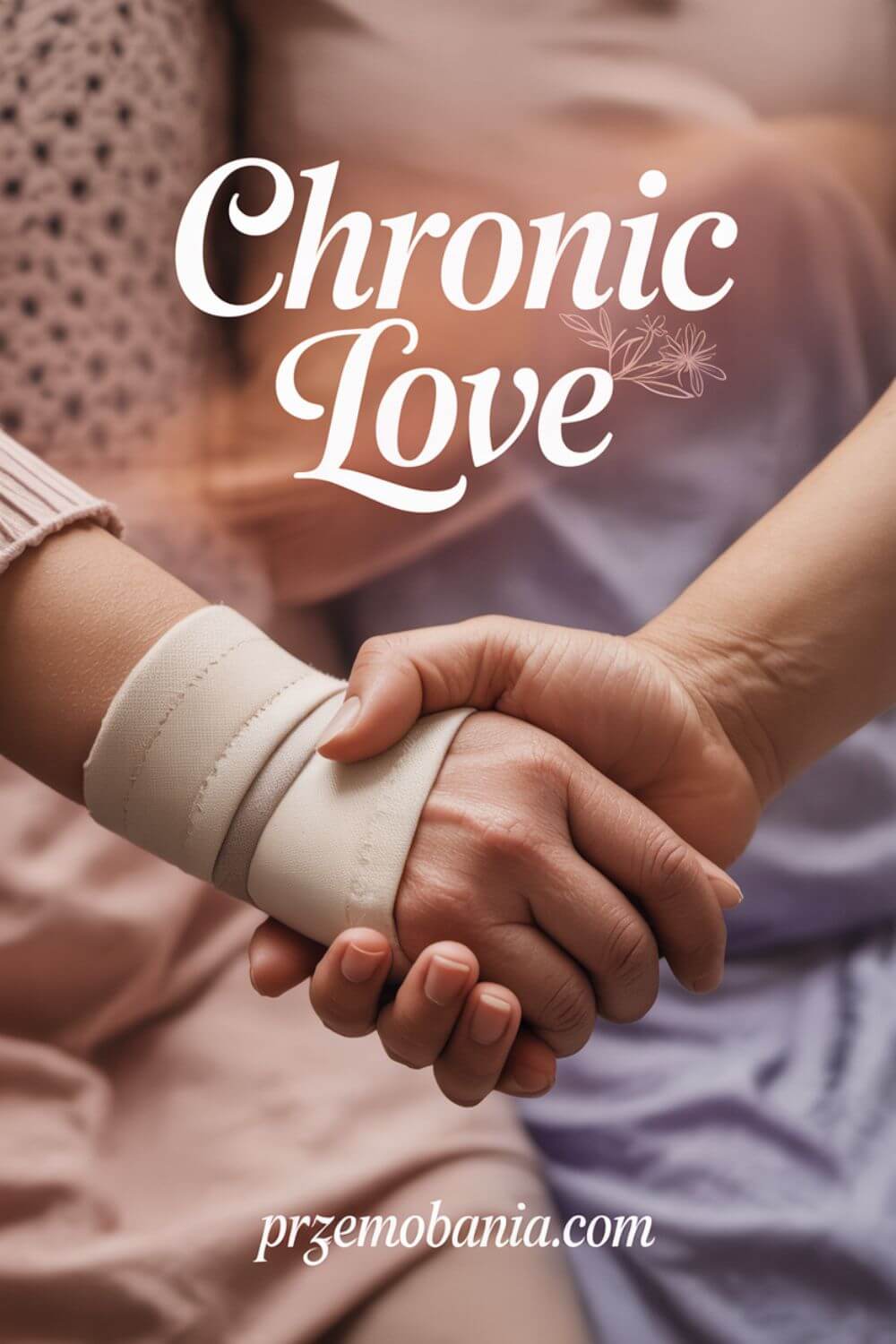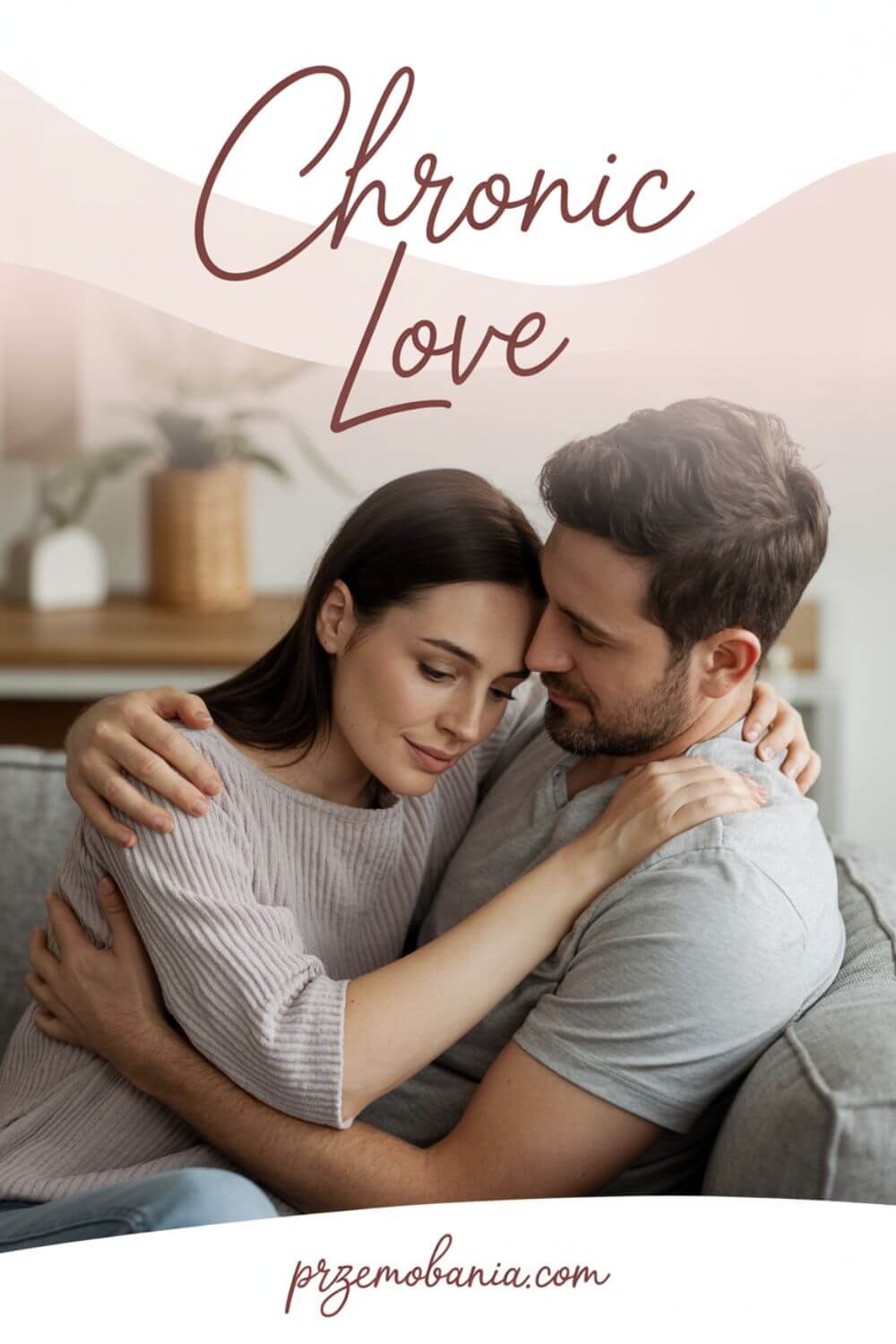Chronic Love – Love and Chronic Illness
Have you ever felt the weight of loving someone with a chronic illness? Has chronic love ever tested the limits of your patience, your strength, or even your identity?
Chronic love is not just about sticking by someone’s side; it’s about holding space for their pain, their silence, their tears, and still choosing them every single day.
When I say “chronic love,” I don’t mean just a long-lasting kind of affection. I’m talking about the deep, soul-binding commitment it takes to love someone who is sick, again and again, with no clear end in sight. It’s when you share life with someone whose body betrays them, and all you want is to take that pain away… but you can’t. So instead, you stay.
Let me take you on a journey into the raw, beautiful truth of chronic love—a love that changed my life and may just help you better understand yours.
- The Depth Behind Chronic Love
- Can Chronic Love Survive the Darkest Moments?
- What Chronic Love Looks Like When No One Else Sees It
- How Does Chronic Love Shape a Relationship Over Time?
- Chronic Love Means Letting Go of the Old and Embracing the New
- Let Go of the Timeline You Thought You’d Follow
- Redefine What Success Means as a Couple
- Embrace the Power of Routine and Safety
- Be Prepared to Advocate When She Can’t
- Learn to Love Her in the Silence
- Don’t Expect Your Needs to Be Met the Same Way
- Build a Life That Honors Both of You
- Celebrate the Small Wins
- Final Word on Chronic Love
The Depth Behind Chronic Love
Loving someone through chronic illness isn’t something you prepare for. Chronic love is not a chapter in your average love story, but it is the entire book rewritten. It demands emotional stamina, daily sacrifices, and a kind of empathy that can’t be taught in words. I had to learn it the hard way, not from a self-help guide or relationship podcast, but by watching the woman I love battle for her life from behind closed doors.
When my wife was diagnosed with endometriosis and fibromyalgia, the concept of “in sickness and in health” suddenly became real. These weren’t just wedding vows; they were tests. They were reminders that her body would one day be in agony, even if her spirit wanted to dance. They were the quiet warnings that some days, she wouldn’t be able to get out of bed, and my role as a husband would become part caretaker, part emotional anchor.
I remember feeling helpless. Sometimes angry. And more than once, I’ll be honest, completely overwhelmed because love doesn’t make you immune to exhaustion. Chronic pain doesn’t just steal from the person who lives with it; it echoes through the people who love them.
But still, I stayed. Not just out of obligation, but because her soul was still in there, buried beneath the pain. She was still my wife. She was still her.
There were nights I sat on the floor outside the bathroom while she cried through a flare-up. Days when her body felt like it was turning against her, and I could only hold her hand. Mornings where I made her coffee, then went to my desk, grateful we built a life that allowed us to work from home, together, safely, on our own terms.
We gave up the traditional 9-to-5 because it gave up on her first. She couldn’t keep chasing a system that was never built for someone like her. So I built something new. A blog. Then two. Then a way for us to travel when she could, rest when she needed, and heal when the world got too loud.
Chronic love isn’t glamorous. It’s not all cozy blankets and romantic rainstorms. Sometimes it’s sitting in silence because she’s too tired to talk. Sometimes it’s biting your tongue when your own needs scream louder than your compassion.
But it’s also sharing a sunset in Italy, a place that makes her feel alive. It’s building a home office filled with her favorite calming scents, and filling her world with comfort where the world gave her pain.
This love taught me that presence matters more than perfection. That support looks different every day. And that when love endures through pain, it becomes something deeper than most people will ever understand.
Because of chronic love? It’s the most honest love there is.

Can Chronic Love Survive the Darkest Moments?
- How do you hold on to chronic love when the person you love asks you to let go?
- What happens when their illness tells them they’re a burden, and they believe it?
These aren’t questions I ever thought I’d have to answer. But I did. More than once. Because chronic illness doesn’t just affect the body, it breaks into the mind, invades self-worth, and twists love into guilt. My wife didn’t just suffer from endometriosis and fibromyalgia.
She also fought a storm inside her mind, depression, OCD, panic attacks, and the unbearable heaviness of chronic illness burnout.
And there were days when she asked me to leave.
Not because she didn’t love me, but because she thought I deserved more. She believed I deserved someone “normal.” Someone who wasn’t always sick. Someone who could travel without anxiety, work without collapse, and laugh without effort. She told me I should go.
But how could I?
When you love someone deeply, leaving isn’t the instinct. Staying is. Even when it’s messy. Even when you feel helpless.
What tore me apart wasn’t just her pain; it was the belief she no longer saw herself as worthy of love. Chronic pain had lied to her. It had whispered in her ear that she was broken, unlovable, too much.
And then it got darker.
She started self-harming. Quietly. Secretly. Until one day, I saw the marks. And I froze.
Then came the words I never wanted to hear: “I don’t want to be here anymore.”
She meant it.
There were two suicide attempts. Let me say that again: two.
I don’t think I’ve ever felt more terrified in my life. I held her body, her trembling hands, after the ambulance left, and I had no words. I just cried. Silently. Because I didn’t want her to feel worse.
And in those moments, chronic love didn’t feel beautiful or romantic. It felt like war. I was fighting for someone who couldn’t fight for herself. I was standing at the edge of her despair and begging her not to jump. Not with words. But with actions. With presence. With unwavering love.
There were days I thought I might break too. Watching the woman you love disintegrate in front of you isn’t something you just get over. But I didn’t leave.
I couldn’t.
Because she was still there. Beneath the pain. Beneath the fear. Beneath the lies her mind was telling her. My wife, the woman I met, the one with dreams and a stubborn, fiery soul, was still there.
So I stayed. And I fought alongside her. Not always perfectly. Not always knowing what to say. But I made damn sure she never felt alone again.
And that’s what we’ll talk about next: what it truly means to support someone in this battle, not just emotionally but practically, intimately, and with a deep understanding of what love must become in the face of chronic illness.

Learn to Listen Without Fixing
When my wife was in the depths of her pain, whether from a fibromyalgia flare-up, endo cramping that made her scream into a pillow, or the panic that came like a wave out of nowhere, my first instinct was always to fix. To offer a solution. To jump into action. But I learned quickly that chronic love isn’t about fixing what’s broken. It’s about staying present with what hurts.
There were moments she didn’t need advice. She didn’t want me to solve anything. She wanted to be heard. She wanted someone to sit next to her and say, “I know it hurts. I’m not going anywhere.”
That kind of listening, silent, steady, without rushing to conclusions, became the foundation of trust in our marriage. She simply needed emotional safety more than solutions. And when I finally understood that, everything changed.
Don’t Take It Personally When She Pushes You Away
Chronic illness plays tricks on intimacy. Sometimes, my wife was so overwhelmed by pain or fatigue that even my touch felt like too much. And that stung, especially when all I wanted was to comfort her. There were nights she withdrew completely, not because she didn’t love me, but because her nervous system was in survival mode.
It took me time to stop internalizing her withdrawal. I had to learn that it wasn’t about me, but it was about her pain. Chronic illness creates emotional walls as a form of protection. And instead of forcing my way through, I learned to wait patiently on the other side, gently letting her know I was there when she was ready.
It’s hard. Rejection – even unintentional – hurts. But in chronic love, understanding replaces ego.
Acknowledge the Psychological Weight She Carries
Chronic illness isn’t just physical, it’s emotional. It’s the loneliness she feels when others stop checking in. The guilt she carries for canceling plans. The shame she feels when she can’t meet expectations she once crushed. I watched as my wife grieved the life she used to have, like her career, the confidence, the energy.
She wasn’t just battling endometriosis and fibromyalgia. She was mourning her identity. And the mental load of that grief is something I had to acknowledge daily.
I began saying things like, “I see how hard this is for you. You’re allowed to feel all of it.” That kind of validation, though simple, made her feel seen, and not just as a patient, but as a whole person who still had worth, even on her worst days.
This isn’t about toxic positivity. It’s about holding space for every emotion she feels.

Rebuild Intimacy in New, Tender Ways
Intimacy doesn’t disappear because of chronic illness, but it does change. For us, it meant redefining what closeness looked like. There were times when sex was impossible, not just physically, but emotionally. The pain was too much. Her self-esteem was too low. The fear of being touched wrongly was too overwhelming.
So we found intimacy in small gestures.
Massaging her back when her muscles ached. Holding hands in the dark when she couldn’t sleep. Making her laugh during the days she wanted to disappear. Chronic love required a softer kind of passion, one that asked, “What do you need today?” instead of expecting what was once routine.
And slowly, we built something more tender. More real. Something rooted in emotional connection, not just physical release.
Make Room for Your Own Feelings Too
I’ll be honest, there were days I felt invisible. Days when I suppressed my emotions because hers were always louder. Days I wondered, “What about me?” That’s a hard thing to admit. But chronic love doesn’t mean erasing yourself. It means finding balance.
I had to give myself permission to feel frustration, exhaustion, even grief. I had to talk to friends, write things down, and breathe deeply when it got heavy. Because if I didn’t take care of my emotional health, I couldn’t show up for her the way she needed.
And that’s the truth about supporting someone with a chronic illness: you have to take care of yourself. Not out of selfishness, but sustainability.
Being her rock didn’t mean being made of stone. It meant being human with boundaries, needs, and feelings that deserved to be honored.
Understand That Sometimes Love Looks Like Survival
There were months, yes – months – when love didn’t look like grand gestures or romantic getaways. It looked like survival. Making sure she had clean clothes. Calling the pharmacy. Getting out of bed when I didn’t sleep because her pain kept her crying through the night.
Love became small acts, done repeatedly, often unnoticed. It showed up when she didn’t recognize herself anymore. It became cooking soup while she sobbed in the bedroom.
And that version of love, though quiet, became the strongest kind we ever knew. It’s the love I never read about in wedding vows, but it’s the kind that endures.
It’s chronic love. And it’s real.

What Chronic Love Looks Like When No One Else Sees It
You know what I’ve realized after years of walking beside my wife through chronic illness, mental health battles, and the chaos it brings into relationships?
Chronic love rarely looks like the love stories we grew up with.
It’s not posted on Instagram. It’s not framed in fairy tale quotes or seen in weekend getaways. It’s raw. Unfiltered. Sometimes brutally silent.
It’s wiping away her tears without asking why, because you already know.
It’s knowing the difference between her “I’m fine” and her “I can’t take this anymore.”
There are days I feel like no one could possibly understand what it means to love someone who is always sick or tired. To watch the woman you adore cry herself to sleep night after night while the world just… keeps turning. It’s a strange kind of isolation.
I remember folding laundry one evening while she lay curled up on the couch, unable to move from another soul-breaking fibromyalgia flare. Her body was stiff. Her eyes glazed. And I stood there, shirts in my hand, thinking, “No one sees this.”
No one sees how love becomes service. How love becomes grit.
But I do.
I see her. I see us. I see the love that’s still alive even in the heaviness.
And this version of love? It’s not less romantic. It’s more. Because when love doesn’t run away from pain, it becomes sacred.
I used to think I had to be strong all the time. To never show my fears. But I’ve learned that being vulnerable with her, telling her I struggle too, that sometimes I feel lost too, brought us closer than anything else. It let her know she wasn’t alone in this, even when her mind tried to convince her otherwise.
We built this life, this work-from-home journey, not just to escape the 9-to-5 grind, but to create safety. For her. For us. For days, she couldn’t walk. For weeks when anxiety wouldn’t let her breathe. For months, when it all felt too heavy.
Chronic love made us creative. It made us brave.
We found a way to live fully, even when her body couldn’t.
And that’s the beauty in it, it forced us to love in ways most people never have to. In the quiet. In the chaos. In the commitment.
You might not see it from the outside.
But this is what chronic love looks like… when no one else sees it.

How Does Chronic Love Shape a Relationship Over Time?
When you’re in it, chronic love doesn’t feel poetic. It doesn’t unfold like a romance novel. It shapes itself slowly, through trial and tenderness, until one day you wake up and realize, you’ve loved someone not just through the beautiful parts, but through their worst pain, their darkest thoughts, their complete unraveling.
That changes a relationship.
At first, I didn’t know how much chronic illness would change our dynamic. I thought I was prepared. I wasn’t. The pain came with unpredictability. Her anxiety with silence. Her depression with distance. And I had to keep loving her through all of it, not just the version of her I met before the flare-ups, before the panic, before the exhaustion carved itself into her every move.
Over time, our roles shifted.
I became not just her husband, but her anchor during storms. Her advocate at doctor’s appointments. Her calm when her nervous system spiraled. Her memory was when she forgot things. Her voice when she has trembled. And through all of that, our love stopped being something we said; it became something we did, day in and day out.
But it wasn’t all one-sided.
She loved me in return, with every ounce of energy she had. Sometimes that love came in a whisper of “thank you.” Sometimes it was the way she looked at me when I brought her tea after a hard night. Sometimes it was just surviving—staying here—when part of her wanted to leave this world.
There were moments of resentment, too.
Moments when I’d feel tired, stretched thin. Moments when I wondered what happened to the freedom we once had. Moments when I missed spontaneity, adventure, and the ease of a “normal” relationship.
But chronic love taught me something priceless: that true intimacy isn’t built in ease—it’s built in endurance. Through this illness, we’ve created a deeper emotional intimacy than we ever could have if life had stayed simple.
She sees me. I see her. In every raw, honest form.
This journey also reminded me why I do what I do. Why I built blogs, a work-from-home life, and chased passive income, not for success, but for freedom.
Freedom to be home when she needs me. Freedom to travel when she’s well. Freedom to live on our terms instead of being crushed by a system that never made space for the chronically ill.
I didn’t choose her illnesses, but I chose her. Every time.
And even now, as we keep figuring it out, through flare-ups, through recovery, through uncertainty, our relationship has become something rare. Not fragile, but forged. Built not just with love, but with choice. Every single day.
That’s how chronic love changes everything. Quietly. Deeply. Forever.

Chronic Illness Changes the Pace of Love
When you’re in a relationship touched by chronic illness, you quickly realize you’re no longer living on society’s clock. You’re not measuring your relationship in vacations or anniversaries, but in flare-ups, recovery days, and the quiet in between. Our pace slowed down. Not because we wanted it to, but because her body demanded it. And I had to adapt.
At first, I fought it. I missed spontaneity, fast mornings, and quick decisions. But then I saw something beautiful in the slowness. I started noticing things, the way her face softened when I made her tea, the way her breath calmed when I simply sat beside her.
Chronic love taught me to live in the now. It reshaped how I love her without urgency, without expectations, just presence.
The Guilt She Carries Is Heavier Than You Think
One of the most painful things I’ve had to witness is the guilt my wife carries. Guilt for being in pain. Guilt for not being able to work like others. Guilt for “ruining” our plans. I’ve told her over and over, “It’s not your fault.” But guilt doesn’t respond to logic; it grows in silence.
She’d say things like “You didn’t sign up for this,” or “You deserve better.” And those words broke me. Because I never once saw her as a burden. But the world, through judgment, through ignorance, made her feel like one. So I held her, not just in my arms, but in every part of her that felt undeserving of love. That’s what chronic love does: it embraces the guilt, without feeding it.
Love Becomes a Language of Actions
Saying “I love you” isn’t enough when your partner feels shattered. Love becomes the unsaid things.
Picking up her prescriptions without being asked. Holding her hair when nausea hits. Standing between her and a dismissive doctor. These are the real “I love yous.”
I don’t always get it right. But I try. Because chronic love is spoken in patience, in effort, in the little things that add up. She may not always be able to meet me where I am, so I meet her where she is. And sometimes, that’s more powerful than any grand romantic gesture. It’s showing up when it’s inconvenient. That’s where love becomes real.
Chronic Love Redefines Masculinity
I’ll admit, growing up, I thought being a man meant being strong, always having the answers, never showing weakness. But chronic love broke that idea down completely. Being her husband taught me that true masculinity is vulnerability. It’s crying with her at 3 AM. It’s saying, “I’m scared too.” It’s admitting when I feel useless but choosing to stay anyway.
The world doesn’t often talk about men like me, partners who care, who feel deeply, who quietly carry emotional weight. But I know there are others out there. And we’re not weak. We’re strong in ways that matter. Strength isn’t about muscles or money, it’s about staying. It’s about loving through the pain. That’s what real strength looks like.
Sometimes, You Grieve Together… and Separately
There were times we both grieved silently in the same room, her grieving the life she lost, me grieving the future I thought we’d have. But we didn’t always know how to share that grief. It would sit between us like a wall.
And sometimes, it made us feel alone even when we were side by side.
I learned to open that space. To say things like, “I miss how things used to be. But I’m still here.” It wasn’t about fixing the grief; it was about letting it breathe. Grieving together didn’t mean having the same pain; it meant making room for both of our versions of loss. And from that space, something softer, deeper grew between us.
Chronic Love Builds Unshakable Trust
There’s something sacred about knowing someone has seen you at your absolute lowest and still stayed. That’s what chronic love has given us: an unshakable trust. I’ve seen her collapse. I’ve seen her scream. I’ve watched her question whether life was worth it. And she’s seen me exhausted, emotionally raw, unsure if I could carry the weight one more day.
And yet, we’re still here.
That kind of trust can’t be forced. It’s built through every hard moment survived together. Through every whispered “I’m not giving up on you.” Our bond isn’t perfect. But it’s real. And it’s been tested in ways most couples will never experience. Which is exactly why it’s so strong.
That’s what chronic love becomes: not a fantasy, but a fortress.

Chronic Love Means Letting Go of the Old and Embracing the New
There was an old us. A version of our relationship that existed before the chronic pain, before the diagnoses, before the panic attacks, and sleepless nights. A time when things felt simple. When we planned without fear. When we didn’t have to explain her fatigue, her tears, her need to cancel, again.
She used to be the life of the room. Radiant. Energetic. Passionate. We had our routines, our dreams, our jokes about weekend getaways and late-night road trips. We thought we had time.
Then her health declined… and everything changed.
And the hardest part? It didn’t change all at once. It unraveled slowly. Day by day, symptom by symptom. Until one day, she looked at me and said, “I don’t even recognize myself anymore.”
That crushed me. Because I still saw her. But I also understood what she meant.
She mourned the old her. The version of herself who could go to work without collapsing in the bathroom from endometriosis pain. The woman who wasn’t afraid of her own mind when anxiety spiraled into self-harm. The woman who could trust her body, her energy, her joy.
I mourned her, too. Quietly. Secretly. Because part of me felt guilty for missing someone who was still here. But I did. I missed how things used to be. The way we used to talk. The way we made love. The way we moved through life without fear of flare-ups or breakdowns.
We both had to grieve. Not just her body, but our old relationship.
That grief was necessary.
But eventually, we reached a point where we had to ask: Do we stay stuck in the mourning? Or do we build something new?
That’s when the new normal began.
We stopped comparing everything to the past. We started creating routines that worked for this version of her, of us. Slower mornings. Flexible schedules. Telehealth appointments. More rest. More communication. More understanding.
I adjusted my work. Built our online businesses. Created a home office not just for productivity, but for healing. We traveled not for adventure, but for joy. For her. To feel free. To give her the sunshine of Italy. The peace of quiet Polish mornings.
Our love adapted.
We fell in love again – not with the people we were, but with who we became after everything.
Chronic love is exactly that: letting go of the fantasy of how life should’ve been and embracing the sacred beauty of what still can be.
It’s not settling. It’s evolving.
And when you allow yourself to stop clinging to the old, you give space for something just as meaningful to rise in its place.
This is our new normal.
It’s quieter, yes. But it’s also softer. Deeper. Stronger.
We’re no longer the people we were when we first met.
But maybe that’s the point.

Let Go of the Timeline You Thought You’d Follow
There’s no roadmap for chronic illness. And there’s definitely no timeline for chronic love. I used to think we’d get married, build careers, travel freely, have kids, and grow old without interruption.
But life laughed at that plan. Chronic illness arrived uninvited and tore up the script we thought we were following.
And I had to let it go. We both did.
We stopped measuring our lives in milestones and started measuring them in moments, like her making it through the day without collapsing, or us watching the sunset in silence after a panic attack passed. That shift was painful at first. But now?
It’s freedom. It’s peace. We’re no longer racing. We’re just living.
Redefine What Success Means as a Couple
Success for us doesn’t look like six-figure salaries or buying a house. It looks like building blogs from home, so she never has to walk into another triggering, fluorescent-lit office again. It looks like her resting midday without guilt. Like me, she canceled meetings because her flare-up needs me more than my to-do list does.
This is the kind of success we fought for, quiet, flexible, ours. We had to redefine everything. And when we did, we stopped comparing ourselves to everyone else. Our life won’t be understood by many. But we didn’t build it for them. We built it for survival. And for love.
Embrace the Power of Routine and Safety
When your partner lives with a chronic illness, safety becomes everything. Predictability. Calm. Routines that don’t overstimulate the nervous system. For us, it’s the scent of lavender in the home office, her weighted blanket nearby, and the morning tea I make her the same way every day.
These routines aren’t boring. They’re sacred.
They’re what keep her grounded when anxiety claws at her. They’re what tell her body, “You’re safe now.” And over time, those little patterns became our rhythm, how we dance through the chaos. Safety isn’t sexy. But it’s essential. It’s the foundation of chronic love.
Be Prepared to Advocate When She Can’t
There were doctor’s appointments where she was gaslit, dismissed, or not believed. She sat in tears, trying to explain symptoms that made her feel crazy. That’s when I learned what it meant to advocate—not just stand by her, but speak for her when her voice was shaking.
I’ve interrupted doctors. Asked better questions. Taken notes. Done research. Because chronic love means showing up not just at home, but in every room where her pain is misunderstood. She’s not alone in those battles anymore. Not when I’m beside her.

Learn to Love Her in the Silence
Some days, there are no words. Just silence. Her body hurts too much. Her thoughts are too heavy. The world feels too loud. And in that quiet, I used to feel helpless.
But over time, I learned to stop filling the silence with solutions. I started just being there. Holding her hand. Sitting in the same room. Not asking her to speak or smile, or explain. Just being the stillness she needed.
That’s where connection lives in chronic love in the spaces between words, where presence becomes everything.
Don’t Expect Your Needs to Be Met the Same Way
This one’s hard to admit. There are times I’ve needed more from her than she could give. Emotional energy. Physical closeness. Even conversation. And I had to grieve that.
But it didn’t mean I was unloved. It meant she was surviving.
So I learned to find support outside of her, too—friends, my writing, my community. And I stopped blaming her for being too tired to carry what I needed. Chronic love isn’t always 50/50. Sometimes, it’s 90/10. Sometimes, it’s just breathing in the same room and calling that enough.
Build a Life That Honors Both of You
It took me a long time to realize that loving her didn’t mean I had to lose myself. I could support her and still chase my own passions. I could help her heal and still dream big. That balance didn’t come easily. But it came.
We built a life where both of us matter.
Where her health is the priority, yes, but where I also feel seen, valued, and alive. That’s what chronic love is supposed to become. Not martyrdom. Not burnout. But mutual understanding. Mutual honor. A love that lifts both of you, even in the mess.
Celebrate the Small Wins
With chronic illness, small wins are everything. A day without pain. A night without panic. A laugh in the middle of sadness. These are the victories we cherish now.
We don’t wait for big breakthroughs anymore. We celebrate the inching forward. The trying-again. The not giving up. Because in a world that doesn’t understand what she fights through daily, we’ve learned to clap for the smallest steps.
And every time we do, our love deepens.
This is chronic love. Tender. Resilient. And built on moments most people will never see.

Final Word on Chronic Love
Chronic love is not something you choose once. It’s something you commit to choosing over and over again on the good days, on the flare-up days, on the days when everything feels like too much, and still, you stay.
It’s not the kind of love that gets talked about in romantic comedies. It’s not dressed in flowers or surprise dinners. Chronic love lives in quiet spaces, between pharmacy trips, doctor appointments, midnight breakdowns, and 3 a.m. moments when she whispers, “I don’t think I can do this anymore.”
I’ve held her through those moments. I’ve watched her body betray her. I’ve sat in silence while she questioned her worth, her purpose, her ability to keep going. And even when she tried to push me away, telling me to leave, to find someone “healthier,” someone “better,”I chose her.
Because chronic love isn’t about having the perfect life. It’s about building a real one. One filled with compassion, patience, and grace. One where the sick days are not deal-breakers, but reminders of your resilience together.
Loving a woman with chronic illness taught me more about humanity than anything else in my life. It taught me how to slow down. How to listen deeply. How to offer presence instead of solutions. And most of all, it taught me that love doesn’t always have to look the way we imagined it to be, to be the most powerful thing we’ll ever know.
The old life we had? It’s gone.
The old her? She had to let that version of herself go.
The old us? We mourned it.
But this new life, the one we rebuilt through pain, through sacrifice, through patience, it’s more real than anything we had before. It’s grounded. Raw. Deep.
We built it by refusing to give up on each other.
To any man walking this path: I see you. I know how lonely it can feel. How invisible you can become. But your presence matters more than you’ll ever know. Not because you’re fixing her, but because you’re choosing to stay.
And to every woman reading this, feeling like a burden, feeling unlovable, feeling like you’ve lost yourself to your illness—I want you to know something from the deepest part of my heart:
You are not too much. You are already more than enough.
Chronic love is not the absence of struggle; it’s the presence of unwavering support in the middle of it.
You are worthy of that love. You are not alone.
You’re stronger than you think, and more loved than you know. This journey might be hard, but together, we can make it beautiful.
If this touched you, I invite you to leave a comment below and download a FREE chapter of my eBook that might speak even deeper to your heart.


About Me
Hi, I’m Lucjan! The reason why I decided to create this blog was my beautiful wife, who experienced a lot of pain in life, but also the lack of information about endometriosis and fibromyalgia for men…
